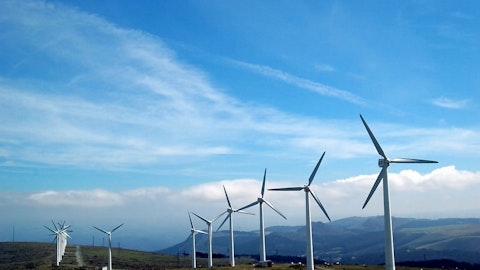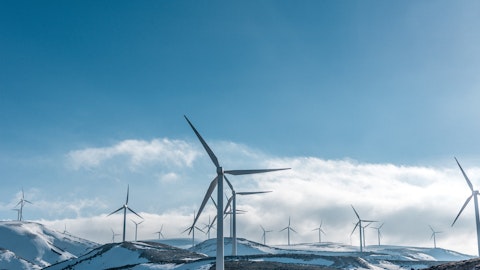Andrew Weisel: Okay, great. That’s reassuring. Then just a very quick follow up on equity, I understand the slightly higher equity related to the higher CapEx. What about the write down following the Illinois rate case in disallowances? Are you not expecting that to lead to additional equity? Or are you awaiting results of rehearings or potential court cases before you decide?
Xia Liu: That write down the additional equity will extend down to Illinois that’s already in the five year plan? It’s included in the new equity numbers I gave you.
Gale Klappa: So we’ve already baked it into the five year plan.
Operator: All right. Our next question comes from the line of Paul Fremont with Ladenburg. Paul, please go ahead.
Paul Fremont: I guess my first question is, does when you look at sort of the 28 outlook for the company, the 5% decrease in the natural gas distribution segment? What does that assume in terms of outcomes in Illinois?
Gale Klappa: It assumes a status quo. Because we just don’t know exactly the outcome of the safety modernization review. Scott?
Scott Lauber: Right. So it assumes that we will still be doing emergency work and work for the city, and some of those real reliability needs. But for assuming the status, until they get through the system, they’ll have a safety modernization program and review that neighborhood program. We don’t have any of that in there.
Gale Klappa: So Scott is right. It assumes some spending because we have to do emergency work related to it. If you can’t fix a pipe and you have to replace it, we have to do that emergency work. And we really do need to cooperate with the city of Chicago when they’re replacing their water mains, for example. So but beyond that, it does not assume any return to the full, roughly 280 million a year, it does not assume that.
Paul Fremont: And presumably, I mean, if the outcome were favorable in Illinois, would that potentially change upward?
Gale Klappa: It certainly could, we’ll just have to see the outcome. And we probably won’t know more on that though, until what do you think Scott –
Scott Lauber: Late at the end of next year, the same time this year, it’s going to take a while to get through, which is the only one to be thorough, so that’s good.
Gale Klappa: And because it’s not only a specific look at the safety modernization program, but with a separate docket on the future of gas, there will be broad policy decisions within a year we believe.
Paul Fremont: Right. And then, can you discuss what comprises the added infrastructure investment? Is that all essentially renewable investment?
Gale Klappa: Oh, yes. Yes, largely solar. But yes, all renewable.
Paul Fremont: Great. And any update on the tender or and where are you in the tender because the early period, I think expired. When does the tender expire?
Gale Klappa: Xia has all the details for you. And yes, the early tender has run its course.
Xia Liu: Yes. The early tender has expired. We expect to tender, a little over $120 million out of the 500 million, all that is coming together.
Paul Fremont: And you’re still waiting for the regular tender to expire, right?
Xia Liu: Correct. But given the expiration of the early tender, we don’t expect much pickup after the early expiration date.
Paul Fremont: Okay. And then I guess, last question, when would we see sort of the annual breakouts of the change in your spending some of the words, the five year numbers?
Xia Liu: We have that in the 10-K. So we’ll issue the 10-K in February, and then we have a February investor deck, which will give you the details for the next three years.
Operator: Thanks, Paul. And our next question comes from the line of Julien Dumoulin-Smith with Bank of America. Julien, the floor is yours.
Julien Dumoulin-Smith: Hey, look, let’s bring it back to your neck of the woods. Super quick. There’s been a lot of conversation on all sides of legislation in Illinois, and a lot of different parties coming to the table obviously doesn’t seem entirely ripe or obvious where that’s going. But, how do you see that kind of meshing up against these various dockets with a future gas? Or, frankly, your own rehearing? We just kind of getting a cohesive set of policies maybe aligning with the governor round, or what have you. I mean, how do you see that possibly coming together? Like, what venue, even if you will?
Gale Klappa: Well, I think I’m not sure if there’s a clear answer to that. But I can give you my opinion. And once you know of my opinion on this because there’s not a clear answer, it could be wrong. But my sense is that every major step that we’re going to see going forward, is going to be under the umbrella of implementing what we call CEJA, the Clean Energy Jobs Act. And I think that you see that path very clearly discussed with by Chairman Scott, as he talks about his decisions and the Commission’s decisions being tied to implementation of that Clean Energy Jobs Act. So that’s, I think, the framework or the umbrella under which a lot of all of these dockets are going to proceed, if you will. And I think the Chairman sees his job as his mandate from the governor of basically putting into action, that piece of legislation.
And one of the most important steps now is going to be at the commission. And with that docket, that they’ve now just authorized, looking at the future of gas in the state of Illinois. And again, that’s going to be very open, very productive. I think. All the stakeholders are going to have their say. And I would just say to you at the end of the day, Midwesterners, Illinoisans are pretty practical people. So I think we’re going to end up with a practical result. That would be my projection at the end of all of those discussions. Scott, anything to add?
Scott Lauber: No, nothing additional. I agree with you. We’ll probably go through that process.
Julien Dumoulin-Smith: I know, it’s a little opaque at the time for the time being but appreciate it. Look, actually related, if we can just talk about QIP, I mean, obviously, there’s an element of trying to get recovery here of spending, is there any portion of spending that can be funneled through, that are or related riders here. I mean, how do you think about, lag in the context of spending in Illinois. I mean, obviously, you’re pulling back on spending here, but I just want to try to make sure we kind of calibrate accordingly to how to think about the business and the ability to earn, you’re at or near your authorized, if you will?



